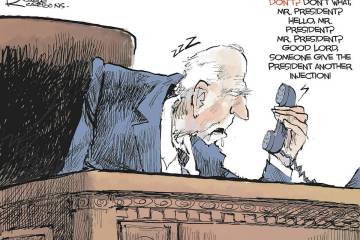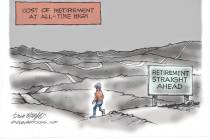COMMENTARY: Think inflation is high now? Imagine if progressives win on health care
Yes, it can get worse, much worse.
Washington’s deficit spending has fueled punishing inflation, but self-styled “progressives” in Congress remain fully committed to ratcheting up federal spending and debt even more.
Vermont Sen. Bernie Sanders recently chaired a Senate Budget Committee hearing on his “Medicare for All” proposal. Like his earlier version, the Senate bill would abolish virtually all private and employer-sponsored health insurance, eliminate Medicaid and even Medicare itself, and establish a “single-payer” system of national health insurance.
Most House Democrats are co-sponsoring similar legislation. Their basic proposition is that their legislation, which will upend coverage for 90 percent of the population, will guarantee higher-quality care for all at lower national and personal costs.
The Sanders bill, like the House Democrats’ companion bill, is especially notable not for what it contains but for what is missing: crucial financing provisions.
Without specifying the kind or the size of taxes required to fund the program, neither the Congressional Budget Office nor independent economists can score the bill and provide anything close to a precise estimate of its effect on the federal budget, the economy or taxpayers. The economic effect is mostly left to educated guesswork.
Educated guess-workers exist. Testifying before the Senate Budget Committee, CBO Director Phillip Swagel reported that the agency had not analyzed Sanders’ bill but had previously conducted an analysis of five versions of the “single-payer” universal coverage program.
Replacing current programs with any of the five “single-payer” options would, according to the CBO analysis, require massive taxpayer subsidies: between $1.5 trillion and $3 trillion in 2030 alone. Moreover, new demand would outstrip the limited supply of medical services, resulting in “congestion” in the system and “delays and foregone care.” Curious what that looks like? Check out Britain and Canada.
Americans will be left poorer, too. Whether the government health program is financed by an income tax or payroll tax, according to CBO, America’s gross domestic product, the nation’s total production of goods and services, would be “approximately 1 percent to 10 percent lower by 2030” than under current law.
Why? Says CBO: “The net reductions in GDP would occur primarily because of the effects of increased taxes on labor and capital income.”
Printing money to cover the cost is a dead end. Says CBO: “Perpetually financing any of the single-payer systems CBO analyzed through increased borrowing — without a corresponding increase in revenues or a reduction in other spending at some point in the future — would be unsustainable.”
And forget “soaking the rich.” Even they aren’t rich enough to cover the ballooning bills racked up under Medicare for All.
Testifying at the same Senate hearing, Dr. Charles Blahous, a former trustee of the Medicare program and scholar at the Mercatus Center, said that to provide “Medicare for All”-level of benefits and services would require spending between $32.6 trillion and $38.8 trillion, or about $120,000 per person, above and beyond any administrative cost-cutting measures. Even at the lower estimate, Blahous observed, a “doubling of all currently projected federal individual and corporate income taxes would be insufficient to finance the added federal costs of enacting” Medicare for All.
The congressional progressives assure us, however, that individuals and families — no longer paying private insurance premiums and deductibles — would still come out ahead with a tax-financed government health program.
Don’t bet on it. Examining previous “Medicare for All” legislation, Heritage Foundation analysts concluded that a “single-payer” program would require a tax of 21.2 percent of earnings (on top of current federal, state and local taxes), hitting nearly two-thirds of American households, meaning that 73.5 percent of Americans would pay more for health care than they do today.
Washington’s frenetic spending is already exacting an exorbitant price. Because of bad federal policy, ordinary Americans are suffering from soaring inflation. They are being threatened by an impending recession and are witnessing a steady depreciation of their savings and retirement income. Over the horizon, Americans’ financial future is already darkened by accumulating deficits and dangerous debt, now exceeding $30.4 trillion — about $94,000 per person in the country.
Ignore silly promises of “free care” for all. If congressional progressives ever succeed in taking over American health care — nearly one-fifth of the American economy — our personal and public finances, bad as they are right now, will get much, much worse.
Robert E. Moffit is a senior fellow specializing in the study of health care and entitlement programs at The Heritage Foundation. He wrote this for InsideSources.com.




























